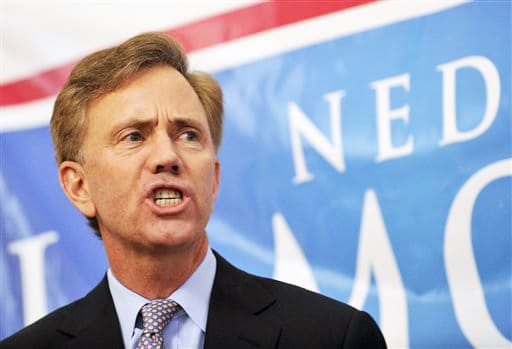
Gov. Ned Lamont SOM ’80 reached an important milestone last week: 100 days in office.
In honor of the traditional benchmark, Lamont and Lt. Gov. Susan Bysiewicz ’83 met with their post-election transition committee to reflect on their progress so far. Many of Lamont’s proposed policies — including progressive moves like increasing the minimum wage to $15 and legalizing marijuana — are making their way through the liberal-leaning state legislature. Lamont also used the meeting to reflect on his efforts to increase bipartisan collaboration and rework the state’s finances.
“[Connecticut] was a little bit fractured,” Lamont said at the policy meeting last Thursday. “I’m trying to bring people together. I think we’ve made a start on that in the first 100 days.”
Lamont campaigned on a platform of revitalizing Connecticut’s economy, which struggled under his predecessor, Democrat Dan Malloy. Referencing his connections to the business world from his time as a telecommunications company entrepreneur, he promised to bring the public and private sectors in the state closer together.
Most of the governor’s efforts thus far have focused on rebooting the state’s transportation infrastructure, including proposals for greater investment in Metro-North — in order to decrease rail travel times between Hartford, New Haven, Stamford and New York — as well as a call to expand Tweed-New Haven Airport.
In an interview with the News, mayoral spokesman Laurence Grotheer noted Mayor Toni Harp’s approval of Lamont’s “vision of connectivity between Connecticut cities” and expressed her hope that New Haven would be the “linchpin” of this new vision.
A major victory on Lamont’s educational front was the state’s recent partnership with Dalio Philanthropies, which pledged $100 million to the state to improve economic development and public education in underserved communities. The donation is the largest in Connecticut’s history.
Still, some of Lamont’s educational proposals have seen pushback. For example, some education advocates in the state have drawn comparisons between the Dalio donation and Facebook CEO Mark Zuckerberg’s $100 million donation to Newark’s public schools, which was meant to transform the city’s school system but had no major impact. In addition, his proposed budget recommends shifting more of the burden of teacher pension payments onto municipalities — a proposal that unions and Republican legislators alike have decried.
“I have fought hard over the last several years to ensure that our municipalities receive the education funding they are promised by the Education Cost Sharing formula, and that they are not put on the hook to pay for the teacher pension liabilities that were promised by state government,” said Sen. Tony Hwang, R-Fairfield, in a statement in response to Lamont’s proposed budget in February. “I am extremely disappointed that Governor Lamont has decided to propose that municipalities cover 25 percent of teacher’s pension obligations.”
One of Lamont’s major accomplishments has been the diversity of his cabinet — his transition committee recommended that at least half of his cabinet members be women, with a special emphasis on women of color. Around half of Lamont’s cabinet is female, including Melissa McCaw — the state’s first black woman budget director.
Many of the governor’s enumerated priorities coincide with policy discussions that have recently been underway in the legislature.
A bill legalizing marijuana has made its way past the Connecticut General Assembly’s Joint Committee on Judiciary by a vote of 21–19. The vote, which fell mostly along party lines, will now move on to the state legislature before it reaches Lamont’s desk.
In March, the Labor and Public Employees Committee voted through an expansion of paid family medical leave for state employees through a system of paycheck-by-paycheck contributions to a state-managed trust fund.
Lamont has simultaneously championed a minimum wage increase from the current hourly rate of $10.10 to $15, portraying minimum wage increase and the expansion of paid family leave as popular policy issues whose passage is inevitable.
Although Lamont agrees with Democrats on many of these proposals, he has split with many members of his party on the subject of new taxes.
“I’m pretty strict on not raising tax rates,” Lamont told reporters last week, noting that even small increases in tax rates add up over time.
But one new tax has Lamont’s backing: tolls on all vehicles passing through several of the state’s major highways, including the Interstate-95 and Interstate-84. The proposal has received a lot of criticism from Republicans. Still, Lamont said last week that even though he acknowledged that tolls are far from a “popular solution,” they are nevertheless a “real solution” to the state’s fiscal crisis.
According to Sacred Heart University political science professor Gary Rose, it will be difficult to draw any definitive conclusions about Lamont’s term until the state passes a budget. For now, Rose said, Lamont’s greatest accomplishment — more than any legislative action — is his ability to bring different parties to the table.
“He seems to be restoring some bipartisan goodwill and trust,” Rose told the News. “It’s a new era with Ned Lamont.”
Senator James Maroney ’96, D-Milford, reemphasized Lamont’s inclusive nature. He told the News that the governor “is trying to achieve consensus on issues as we move forward.”
Rose noted that Lamont’s greatest obstacle at the moment is his status as a political outsider who does not know all the ins and outs of the legislative process. However, he does not believe that the length of budget negotiations will compare to the last set of negotiations under Malloy. Connecticut was the last state to pass its most recent budget after a record-breaking 123-day impasse.
Lamont is the Nutmeg State’s 89th governor.
Nathalie Bussemaker | nathalie.bussemaker@yale.edu
Emiliano Gómez | emiliano.gomez@yale.edu







